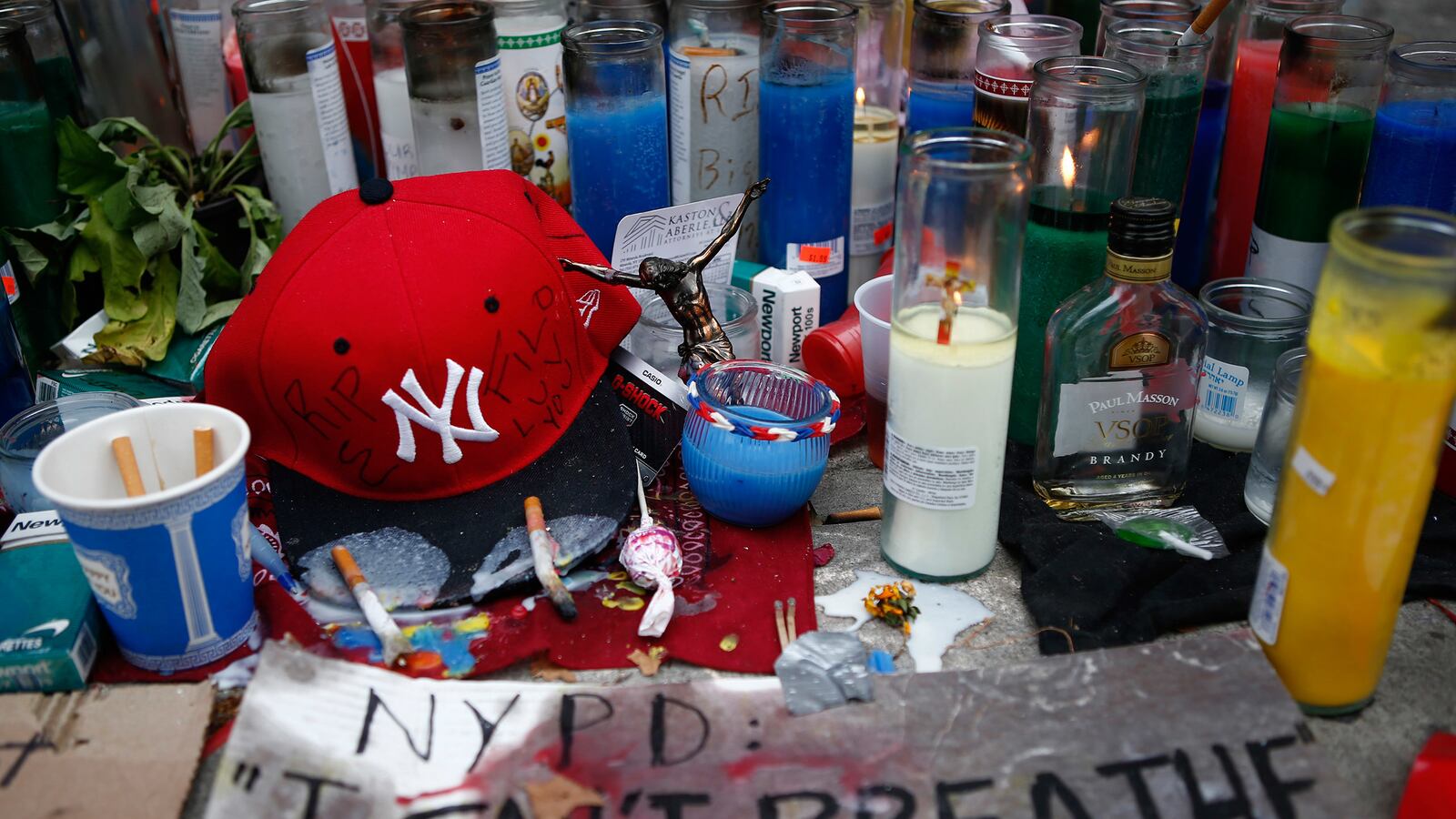My God, I’ve heard that voice before.
That fed-up, tear-stained, sick-of-this-BS voice. That throwing my hands straight up in the air voice, that I don’t care if you think my upraised hands are dangerous or not voice. The voice of Eric Garner, outside his corner store, not theirs. Living his life, not theirs. Minding his own business, not theirs. Moments before he died.
Scratch that. Eric Garner didn’t “die.” Such a weak, irregular, mismatched verb, “die.” Plop. Jump. Die.
Eric Garner didn’t just die. His own, personal neck and chest were compressed by five other men until 43 years of life and spirit seeped away. Eric Garner was bent over, wrestled down, spread out, and squeezed until he popped. Call it what you want, but it’s not a regular death.
But back to that voice. I watched Garner die on tape and wondered why I was crying so hard when I am not that much of a cryer at all. And I thought—Jesus (sincere petition, I try to talk to him with some frequency)—Jesus, the last time I cried these same stupid salty tears, I was using that same voice. Eric Garner’s voice before he died.
It is a little over a year back. I am with a few friends at a pizza spot in D.C., on Mass Ave., just about 10 blocks from the White House. One friend gets into the mildest of arguments about the pizza we were served—the type of pizza we were requesting, one slice being cold, and the clerk refused to warm it up, etc. For whatever reason—maybe because our suits, doctor’s scrubs, and government badges aren’t on that day, just jeans and hoodies—the young man tells us to eff off and keep it moving. He goes on to serve the next customer.
We object to this treatment, of course—loudly, no force, just words—under the silly assumption that we have the right to be treated like any other customer with a cold-pizza problem. But instead of talking to us and resolving the issue, or getting a manager involved, the clerk calls the cops.
No more than three minutes later, a handful of policemen rush in and tell us to get out of the store. One of my friends starts objecting: “Why are we the ones who have to leave? Can I just get my pizza?” But before the words are fully out of his mouth we are shoved outside, bent over the tables on the restaurant’s patio, and two of us are put in handcuffs.
That’s when the emotions start colliding, and the Garner voice comes out.
We see folks inside the restaurant looking out, and cars driving by, and wonder if someone from work will see us, and what they’ll think.
The cops are yelling and I sense not just anger in their eyes but also their fear. The thoughts race—I didn’t think I was someone to be afraid of? Maybe I am?
Should I have worn my suit that day? Called out my credentials? Maybe taken the cold pizza and shut my mouth?
Wait—what? Why should I have to do any of those things? I am not wrong. My personhood, my place on this earth, and my spot in this goddamn pizza shop are not wrong. There is nothing wrong with me. They are wrong, and I am going to tell them.
So I tell them, with my Garner voice on full tilt, bent over that table, until the officer tells me that if I say one more word I am “going in the van.” So I have a choice to make.
Shut up, take it, and leave. Or keep protesting and go to jail.
Most rational people would do the former, but I am too pissed to be rational. Through tears and anger I keep talking until my dear friend, not handcuffed, covers my mouth with his hand and reminds me that my wife will want to see me that night. That I have an important meeting the next day. That I should just go home.
So that’s what we do. Go home. Furious, insulted, humiliated, but alive and free.
I still feel disgusted with myself for letting some punk kid in a pizza shop and a police officer who couldn’t take a second to listen rob my friends and me of our dignity that day. I’m still curious who saw us bent over those tables. I still wonder what my wife thinks about her big courageous man coming home shaken, seeing my tears for the first time. It wasn’t the first time something like this had happened to me, but the first time as a married man with more to lose.
Unlike Eric Garner, I have the luxury to wonder, to think those thoughts, because after that petty, stupid confrontation, I’m still here.
And what still haunts me about Garner is his voice. My voice. The same voice that black folks use around this country every day. Watch the video again. Listen to what he said.
Garner’s dying phrase—“I can’t breathe”—is important, and trending worldwide. But it’s what he proclaimed a few moments before that matters even more.
“Every time you see me you want to mess with me.”
“Please just leave me alone.”
“I’m tired of it. It stops today.”
Garner didn’t know it, but it did stop that day. Not just because he was murdered a few moments later. But because the watchful eyes and ears of young activists—far wiser and more sensitive to the cultural moment that we’re in than many of the rest of us—decided to listen to him. To carry his voice forward, onto the streets of New York and D.C. and Chicago and elsewhere.
We’ve reached a tipping point that the country has not seen since 1965, when we mistakenly assumed that our brief efforts to heal the deep racial harms in this country ended after the signing of a few important laws. In the wake of Michael Brown and Eric Garner, things will not be the same.
Importantly, this will not just be about law enforcement. Racism and bias, explicit or implicit, is beginning to be confronted in nearly every aspect of American life, from the classroom to the boardroom to the newsroom, from Silicon Valley to the halls of Congress, and folks will be forced to confront it in their own souls as well as the delusions of a post-racial society crumble and fall.
Folks are finding their voice. That desperate, honest, human voice, a voice willing to see change, or die, but in any event never to back up again.
“I’m tired of it. It stops today.”






